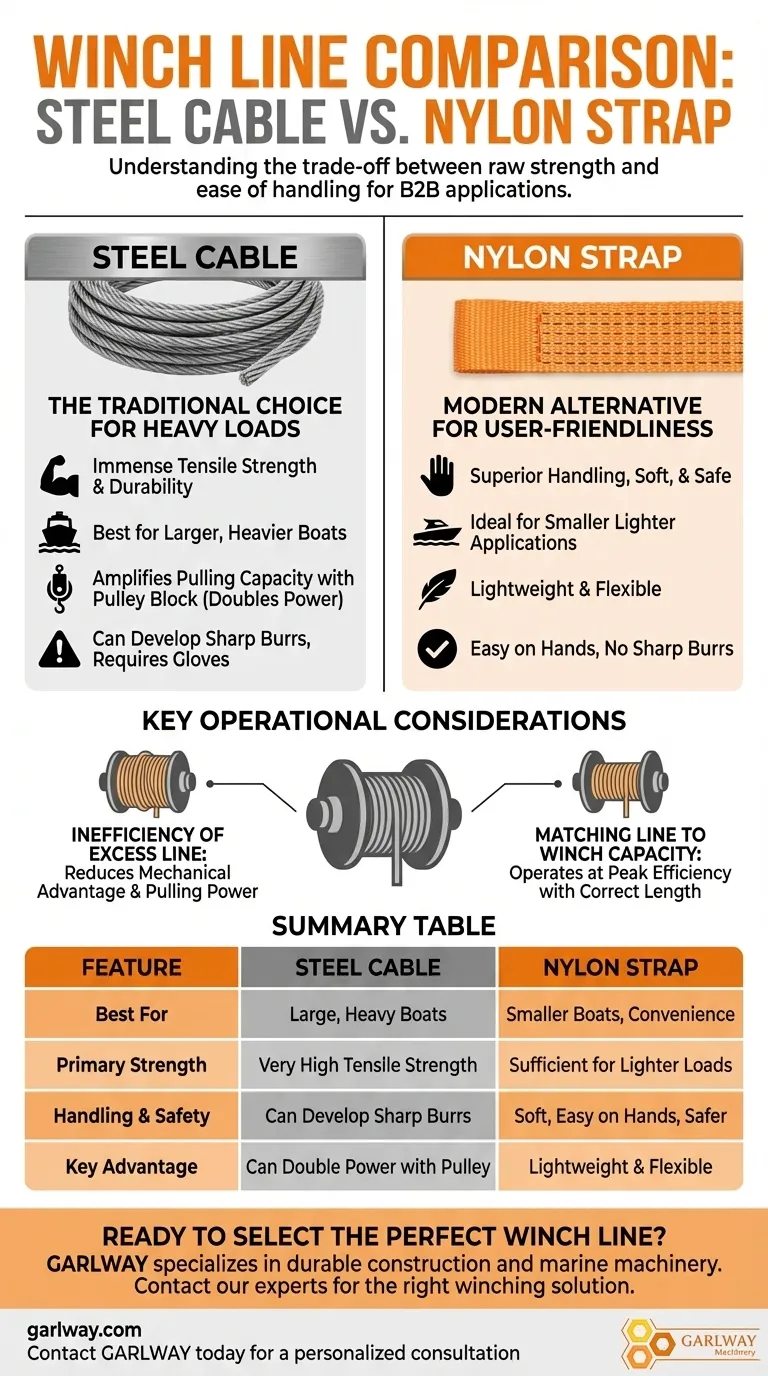At its core, the difference between steel cable and nylon strap winch lines comes down to a trade-off between raw strength and ease of handling. Steel cable is significantly stronger and is the standard for larger, heavier boats, while nylon straps are more user-friendly and perfectly suitable for smaller vessels.
The decision is not simply about which material is "better," but which is appropriate for the task. Steel cable offers maximum pulling power for heavy loads, whereas nylon straps provide safety and convenience for lighter applications.

Analyzing Steel Cable
Steel winch cables are the traditional choice for heavy-duty applications, prized for their immense tensile strength and durability.
The Standard for Heavy Loads
Steel's primary advantage is its strength. This makes it the necessary choice for winching larger, heavier boats where the forces involved exceed the capacity of synthetic materials.
Amplifying Pulling Capacity
A key operational advantage of steel cable is its compatibility with a pulley block (or snatch block). By rigging the cable through a pulley, you can nearly double the effective pulling capacity of your winch.
Analyzing Nylon Straps
Nylon straps offer a modern alternative focused on user-friendliness and safety for lighter-duty winching.
Superior Handling and Ease of Use
Unlike steel cable, which can develop sharp burrs over time, nylon straps are soft and easy on the hands. This makes the process of handling the winch line simpler and safer.
Ideal for Lighter Applications
For smaller boats, a nylon strap provides more than enough strength. Its lighter weight and flexibility make it a practical and efficient choice when maximum pulling power is not the primary concern.
Key Operational Considerations
Beyond the material itself, how you manage your winch line directly impacts performance, especially with manual winches.
The Inefficiency of Excess Line
A common mistake is to load a winch drum with too much line. On manual winches, each layer of cable or strap on the drum reduces the winch's mechanical advantage, effectively lowering its pulling power.
Matching Line to Winch Capacity
Using only the necessary length of line for your typical use case ensures your winch operates at its peak efficiency. Excess line that is never used only serves to reduce the force you can apply.
Making the Right Choice for Your Boat
Your choice should be guided by the weight of your boat and your priority for either strength or convenience.
- If your primary focus is maximum strength for a large, heavy boat: Steel cable is the correct and necessary choice for its superior capacity.
- If your primary focus is ease of use for a smaller boat: A nylon strap offers sufficient strength with the added benefits of safer and more comfortable handling.
Choosing the right winch line ensures you can operate safely and efficiently for your specific needs.
Summary Table:
| Feature | Steel Cable | Nylon Strap |
|---|---|---|
| Best For | Large, heavy boats | Smaller boats, user convenience |
| Primary Strength | Very high tensile strength | Sufficient for lighter loads |
| Handling & Safety | Can develop sharp burrs | Soft, easy on hands, safer |
| Key Advantage | Can double pulling power with a pulley block | Lightweight and flexible |
Ready to select the perfect winch line for your vessel?
GARLWAY specializes in durable construction and marine machinery, offering robust winches and accessories trusted by contractors and boat owners globally. Our experts can help you choose the right equipment for maximum efficiency and safety.
Contact GARLWAY today for a personalized consultation and get the right winching solution for your project!
Visual Guide

Related Products
- Portable Small Trailer Winch
- Small Electric Winch 120V and 240V for Compact Applications
- Commercial Construction Mixer Machine for Soil Cement Mixing Concrete
- Electric and Hydraulic Winch for Heavy Duty Applications
- Ready Mixer Machine for Construction Ready Mix Machinery
People Also Ask
- What is a hand chain block and how does it work? A Guide to Manual Lifting Power
- What are the primary applications of hydraulic winches in maritime operations? Powering Critical Tasks at Sea
- What should be done before starting the hoist? A 3-Step Safety Protocol to Prevent Accidents
- Where are hydraulic winches commonly used? Essential for Heavy-Duty Industrial & Recovery
- What preventive measures can be taken to avoid oil leakage in hydraulic winches? Ensure Long-Term Reliability
- What is the operational continuity of hydraulic winches? Uninterrupted Power for Heavy-Duty Pulling
- Why is it important to prepare building sites in advance for cement delivery? Ensure a Successful Pour
- What is a hydraulic winch? The Ultimate Guide to Continuous Heavy-Duty Pulling Power












